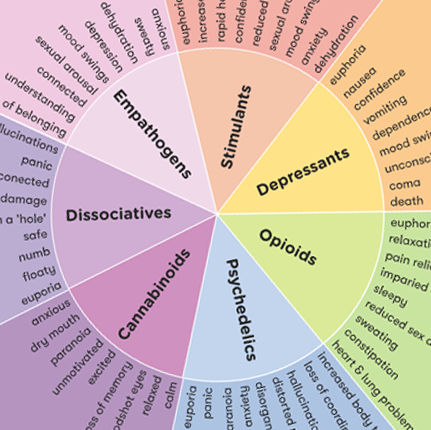Depressants and stimulants are drugs that have a significant effect on the human body. Depressants are substances that slow down the activity of the central nervous system, while stimulants increase the activity of the central nervous system. As such, these two types of drugs have both positive and negative effects when used responsibly.
The effects of depressants and stimulants vary greatly depending on the drug, dosage, and individual. It is important to understand the differences between the two and the potential risks associated with using these drugs. This article will explore what drugs are depressants and stimulants, their effects on the body, and how they can be used safely and responsibly.
Depressants, such as alcohol, barbiturates, and benzodiazepines, slow down brain activity to produce a calming effect. Stimulants, such as cocaine, methamphetamine, and caffeine, speed up brain activity and often result in increased energy and alertness.

What Are Depressants and Stimulants?
Depressants and stimulants are drugs that alter the chemical balance of the central nervous system. These drugs can be prescribed by doctors for a variety of medical conditions or used illegally for recreational purposes. Depressants slow down the activity of the central nervous system, while stimulants speed it up. Both of these types of drugs have potential for abuse, and can have serious side effects if not used as prescribed.
Depressants
Depressants, also known as tranquilizers, slow down the activity of the brain and nervous system. Commonly prescribed depressants include benzodiazepines, such as Valium and Xanax, and barbiturates, such as Seconal and Amytal. These drugs are usually prescribed to treat anxiety, insomnia, and seizures. Depressants can also be used to treat alcohol withdrawal symptoms and to relieve muscle spasms. Depressants can be highly addictive and can cause physical and psychological dependence.
Long-term use of depressants can lead to serious health problems, including slowed heart rate, slowed breathing, impaired thinking, and poor coordination. Depressants can also cause drowsiness and confusion, and can impair judgment, making it dangerous to drive or operate machinery while taking them.
Stimulants
Stimulants are drugs that speed up the activity of the brain and nervous system. Commonly prescribed stimulants include amphetamines, such as Adderall and Ritalin, and methylphenidate, such as Concerta and Daytrana. These drugs are usually prescribed to treat attention-deficit hyperactivity disorder (ADHD), narcolepsy, and depression. Stimulants can also be used to treat obesity and to boost athletic performance.
Stimulants can be highly addictive and can cause physical and psychological dependence. Long-term use of stimulants can lead to serious health problems, including increased heart rate and blood pressure, insomnia, anxiety, and paranoia. Stimulants can also cause side effects such as headache, loss of appetite, and irritability. Taking large amounts of stimulants can cause dangerously high body temperatures, irregular heartbeat, and even death.
Frequently Asked Questions
Drugs can be divided into two main categories: depressants and stimulants. Depressants cause the central nervous system to slow down, while stimulants speed up the central nervous system. In this article, we will discuss what drugs are depressants and stimulants.
What are Depressants?
Depressants are drugs that slow down the central nervous system. They can be used to help people relax, reduce stress, and treat certain medical conditions. Common depressants include alcohol, barbiturates, benzodiazepines, opioids, and sedatives. These drugs can be highly addictive and can have serious side effects, including respiratory depression, slowed heart rate, and impaired coordination and judgment.
What are Stimulants?
Stimulants are drugs that speed up the central nervous system. They are often used to treat attention-deficit hyperactivity disorder (ADHD), narcolepsy, and obesity. Common stimulants include amphetamines, cocaine, and nicotine. These drugs can be highly addictive and can have serious side effects, including increased heart rate, elevated blood pressure, restlessness, and anxiety.
What are Commonly Used Depressants and Stimulants?
Common depressants include alcohol, barbiturates, benzodiazepines, opioids, and sedatives. Common stimulants include amphetamines, cocaine, and nicotine.
What are the Effects of Depressants and Stimulants?
The effects of depressants include respiratory depression, slowed heart rate, and impaired coordination and judgment. The effects of stimulants include increased heart rate, elevated blood pressure, restlessness, and anxiety.
Are There Any Health Risks Associated with Depressants and Stimulants?
Yes, there are serious health risks associated with both depressants and stimulants. Depressants can cause respiratory depression, slowed heart rate, and impaired coordination and judgment. Stimulants can cause increased heart rate, elevated blood pressure, restlessness, and anxiety. Both depressants and stimulants can lead to addiction and overdose. People should use caution when taking depressants and stimulants and should always follow the directions provided by their doctor.
Drug Awareness: Depressants, Hallucinogens And Stimulants
In conclusion, depressants and stimulants are two of the most commonly used drugs and can have a wide range of effects on the body. Depressants slow down the central nervous system and can provide a calming, sedative effect, while stimulants speed up the central nervous system and can have energizing, alerting effects. Both types of drugs can be found in prescription medications as well as illegal drugs, and both can be abused. When used in moderation and under the care of a doctor, these drugs can be beneficial, but they can also be dangerous when misused. It is important to understand the risks associated with depressants and stimulants and to always use them responsibly.
